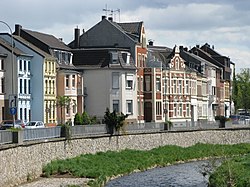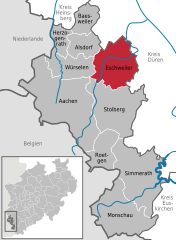world.wikisort.org - Germany
Eschweiler (German pronunciation: [ˈɛʃvaɪlɐ], Ripuarian: Eischwiele) is a municipality in the district of Aachen in North Rhine-Westphalia in Germany on the river Inde, near the German-Belgian-Dutch border, and about 15 kilometres (9 mi) east of Aachen and 50 kilometres (31 mi) west of Cologne.
This article needs additional citations for verification. (January 2014) |
Eschweiler | |
|---|---|
Town | |
 Indestraße in Eschweiler | |
 Coat of arms | |
Location of Eschweiler within Aachen district  | |
 Eschweiler  Eschweiler | |
| Coordinates: 50°49′N 6°17′E | |
| Country | Germany |
| State | North Rhine-Westphalia |
| Admin. region | Cologne |
| District | Aachen |
| Subdivisions | 22 |
| Government | |
| • Mayor (2020–25) | Nadine Leonhardt[1] (SPD) |
| Area | |
| • Total | 76.559 km2 (29.560 sq mi) |
| Highest elevation | 262 m (860 ft) |
| Lowest elevation | 110 m (360 ft) |
| Population (2020-12-31)[2] | |
| • Total | 56,172 |
| • Density | 730/km2 (1,900/sq mi) |
| Time zone | UTC+01:00 (CET) |
| • Summer (DST) | UTC+02:00 (CEST) |
| Postal codes | 52249 |
| Dialling codes | 02403 |
| Vehicle registration | AC, MON |
| Website | www.eschweiler.de |








History
- Celts (first ore mining) and Romans (roads and villae rusticae).
- 828 First mentioned by Einhard, the biographer of Charlemagne.
- 1394 Coal mining first mentioned.
- For some centuries part of the Duchy of Jülich.
- 1678 Completely destroyed except one house and the valuable leather Pietà.
- 1794 To France.
- 1800 French municipal rights and capital of the Canton of Eschweiler in the French Département de la Roer.
- 1816 To Prussia. The French Cantons of Burtscheid and Eschweiler are put together to form the Prussian Kreis Aachen.
- 1838 Foundation of the first joint stock company in the then Kingdom of Prussia: Eschweiler Bergwerksverein (i.e. Eschweiler Coal Mining Company) EBV.
- 1858 Prussian municipal rights. Its quarters Hehlrath, Kinzweiler and St. Jöris are released in order to form the new municipality of Kinzweiler.
- 1932 Hastenrath and Nothberg become a part of Eschweiler.
- 1944 Heavily destroyed in World War II, the last coal mine was flooded during the war and never been re-opened.
- Part of the federal land of North Rhine-Westphalia.
- 1960s Complete modernization of Eschweiler's downtown and regulation of the Inde in order to prevent the regular inundations.
- 1972 Reorganization of administration in North Rhine-Westphalia: Eschweiler increases overnight from some 38,000 inhabitants to about 55,000 by receiving the villages Dürwiß, Laurenzberg, Lohn and Weisweiler. Kinzweiler, after 114 years, comes back.
- 1970s Eschweiler loses seven quarters because of the brown-coal opencast mining: Erberich, Hausen, Langendorf, Laurenzberg, Lohn, Lürken and Pützlohn.
Main sights
Eschweiler main sights include:
- Artificial lake Blausteinsee ("Blue Stone Lake")
- the Old Townhall (which is now the restaurant and conference wing of a hotel)
- two pilgrim churches
- main parish church of St. Peter und Paul with the Leather Pietà from 1360
- the chapel
- dwelling house of the former Cistercians nunnery of St. Jöris, skull relic in St. Jöris' church, baroque altar in Hehlrath's church
- Old Mill of Gressenich.
Also present is a series of castle and manors:
- Castle of Eschweiler (only three towers from the 13th century are left)
- Castle of Kambach (beautiful water castle besides the golf course)
- Castle of Kinzweiler
- Castle of Nothberg
- Castle of Palant
- Castle of Röthgen
- Castle of Weisweiler (only the towers and the outer walls are left)
- Manor of Broich
- Manor of Drimborn
- Manor of Nothberg
Culture
Eschweiler has three municipal halls (Dürwiß, Kinzweiler and Weisweiler), a cinema, a municipal art collection and the so-called Culture Centre Talbahnhof for cabaret and music events. Every summer the Eschweiler Music Festival EMF takes place. People go to the numerous pubs around the Market Place and in the old-town alley Schnellengasse as well as to the large-scale discothèque Klejbor's.
Carnival
Eschweiler is a center of Rhineland carnival. It has more than 20 active carnival clubs, and every Monday before Lent it has the third of Germany's longest carnival processions.
Culinary specialities
- Sauerbraten
- Potato fritters (Reibekuchen) with black bread, apple syrup, sugar beet syrup or stewed apples
- Blood sausage (Blutwurst) crude or fried
- Hemmel on Äed (i.e. Heaven and Earth) mashed potatoes with stewed apples and fried blood pudding or fried panhas
- Rice pies, apricot pies, pear pies ("Schwatze Flaam") - 20 cm in diameter; the pear pies, also called black pies, are traditionally served at funerals
- Horse and horse by-products
Medical care
Eschweiler is home to the St. Antonius Hospital with 443 beds and 13 departments. Every year, there are some 15,000 in-patients and 25,000 out-patients. The Euregio Breast Centre is part of the hospital.
Sports
Soccer, ice hockey, golf, open-air swimming pool, indoor swimming pool, horse sports, handball.
Industry
Chemicals and goods are the main products, while it also has a lignite-powered power plant rated at 2.8 GW.
Science
The lignite (brown coal) deposits in the region are former Miocene swamp forest dominated by Castanopsis, a type of chinkapin. Such plants do not occur naturally in Europe. A type of fossil wood has been described from logs found in Eschweiler mines. It was named Castanoxylon eschweilerense in reference to the town; the name would translate as "Eschweiler chinkapin wood", as it probably belonged to Castanopsis but perhaps to some other genus of chinkapin.
Transport
Eschweiler has six railway stations: Eschweiler Hauptbahnhof (central station), Eschweiler-Aue (from 2009), Eschweiler-West, Eschweiler-Talbahnhof, Eschweiler-Nothberg, Eschweiler-Weisweiler and Nothberg (till 2009). Eschweiler-St. Jöris is planned.
Eschweiler has two bus terminals and bus lines in every quarter and in its whole vicinity. Autobahn exits on the A 4 include Eschweiler-West, Eschweiler-Ost and Weisweiler. The city can be reached also by three exits on the A 44: Aldenhoven, Alsdorf and Broichweiden.
Notable people
- Anna Sorokin (born 1991), fraudster
- József Ács (born 1948), composer, conductor, director of the Franz Liszt Society of Eschweiler
- Theo Altmeyer (1931–2007), tenor
- Heinrich Boere (1921–2013), German-Dutch war criminal
- Götz Briefs (1889–1974), national economist and social philosopher
- Willibert Kauhsen (born 1939), racing driver
- Johannes Bündgens (born 1956), auxiliary bishop of Aachen
- Markus Daun (born 1980), soccer player
- Gerhard Fieseler
- Andreas Gielchen (born 1964), soccer player
- Susanne Kasperczyk (born 1985), soccer player
- Claus Killing-Günkel (born 1963), esperantologist
- Sascha Klein (born 1985), water jumper
- Kevin Kratz (born 1987), footballer
- Wilhelm Lexis (1837–1914), economist, national economist and statistician
- Franz Reuleaux (1829–1905), mechanical engineer
- Michaela Schaffrath (born 1970), porn actress (Gina Wild) and actress
- Karl-Heinz Smuda (born 1961), ghostwriter, editor and publisher in Berlin and Norfolk / Virginia (USA)
- Ralf Souquet (born 1968), poolbillard player
- Martin Stevens (born 1929), politician
- August Thyssen (1842–1926), founded the Thyssen-Foussol & Co. in Duisburg in 1867, and later on other steelworks. The company entered the ThyssenKrupp AG in 1997
- Joseph Thyssen (1844–1915), industrialist and the younger brother of August Thyssen
Notable people from Hehlrath
- Martin Schulz (born 1955), SPD - politician, Chairman of the Group of the Social Democratic Party of Europe in the European Parliament
Twin towns – sister cities
Eschweiler is twinned with:[3]
 Reigate and Banstead, England, United Kingdom (1985)
Reigate and Banstead, England, United Kingdom (1985) Sulzbach-Rosenberg, Germany (2019)
Sulzbach-Rosenberg, Germany (2019) Wattrelos, France (1975)
Wattrelos, France (1975)
References
- Wahlergebnisse in NRW Kommunalwahlen 2020, Land Nordrhein-Westfalen, accessed 19 June 2021.
- "Bevölkerung der Gemeinden Nordrhein-Westfalens am 31. Dezember 2020" (in German). Landesbetrieb Information und Technik NRW. Retrieved 21 June 2021.
- "Partnerstädte". eschweiler.de (in German). Eschweiler. Retrieved 2021-02-02.
External links
- Official site (in German)
На других языках
[de] Eschweiler
Die Stadt Eschweiler [.mw-parser-output .IPA a{text-decoration:none}ˈɛʃˌvaɪlɐ] (von lateinisch Ascvilare, Eschweiler Platt Aischwiile, französisch (veraltet) Exvilliers) ist eine mittlere regionsangehörige Stadt in der Städteregion Aachen. Sie ist ein voll ausgebautes Mittelzentrum mit einem der größten Krankenhäuser der Region, Sitz mehrerer Behörden wie der Bundespolizei und regional bedeutender Kultureinrichtungen sowie Karnevalshochburg. Aufgrund ihrer zentralen Lage und Autobahnanbindung bildet sie einen Verkehrsknotenpunkt in der Städteregion. Von der Keltenzeit bis ins 20. Jahrhundert prägten Bergbau und Tagebau die Stadt. Sehenswert sind die zahlreichen Burgen und Herrenhäuser sowie die Inde-Auen und der Blausteinsee.- [en] Eschweiler
[ru] Эшвайлер
Эшвайлер (в русской исторической литературе принято название Эшвейлер; нем. Eschweiler, рип. Aischwiele) — город в Германии, в земле Северный Рейн-Вестфалия.Другой контент может иметь иную лицензию. Перед использованием материалов сайта WikiSort.org внимательно изучите правила лицензирования конкретных элементов наполнения сайта.
WikiSort.org - проект по пересортировке и дополнению контента Википедии
